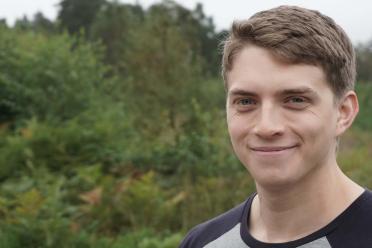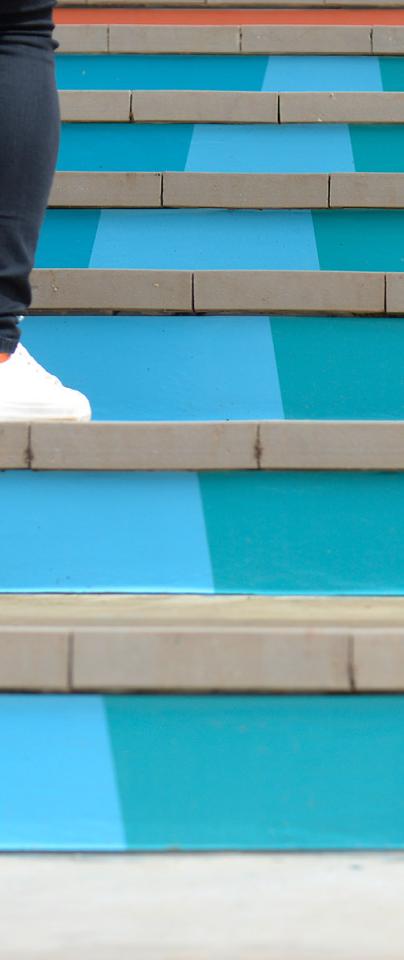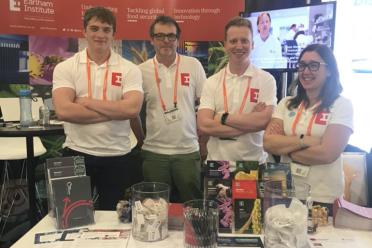My advice for PhD students? See what bites
PhD student Ben Coombes tells us all you need to thrive in a research career is “a question to pursue and freedom to pursue it”.
All you need to thrive in a research career is “a question to pursue and freedom to pursue it”, words of wisdom that led Ben Coombes to the Earlham Institute to work on one of the world’s most important crops.
Hi, I’m Ben, a second year PhD student in the Anthony Hall group at the Earlham Institute. I use bioinformatic approaches to explore genomic datasets and improve our understanding of novel sources of genetic variation in wheat, with the aim of helping breeders to improve crops.
I’ve wanted to do a PhD since I started my GCSEs but was always changing my mind about what area of research I wanted to pursue. In my final year of university I had some serious doubts - and even thought about dropping out and starting all over again.
I was suddenly faced with choices that would define my life and I got scared. My tutor, Paula Kover, recognised her own intellectual restlessness in me and gave me a piece of advice that I hold close to me to this day. She told me that I could switch degrees, switch fields all I like but I would most likely end up with the same set of doubts a few years down the line.
All you need, she told me, is a question to pursue and freedom to pursue it and you will thrive. The question doesn’t really matter, and you’ll probably change interests throughout your career, but you just need to get in and start doing research.
So, I set aside my worries and entered my final year. I did a plant genomics project with my tutor for my honours project, in which I taught myself coding and bioinformatics.
I was instantly hooked.

I joined the Anthony Hall group at the Earlham Institute two months before the start of my PhD as a research assistant to process some nanopore sequencing data that had been sitting on a hard drive.
The pipeline I established to analyse this data produced some promising results - and what was effectively a side project has ended up forming a large component of my work to date and is currently being prepared for publication. This project has taught me most of the skills I know, and has allowed me to contribute to other papers being developed in the group.
Despite this work taking centre stage so far, I’m still working on my PhD work that has evolved drastically over time. The initial approaches we decided to pursue didn’t work out, so we kept iterating and refining, exploring datasets and the direction of the field.
We’ve finally landed on the direction this work should be taken and it’s pretty exciting, although radically different from what we originally had planned. I’ve spent a lot of time working on things that we’ve discarded. This can seem discouraging but each time we’ve moved a step towards our final plan, which we wouldn’t have reached without being immersed in exploring different approaches.
I would advise other PhD students to cast a wide net and see what bites. Trying to force a particular line of enquiry simply to adhere to the initial proposal for your project often just leads to unproductive science. In some cases, particularly when the research is funded by charities or industrial partners, there may be stricter boundaries you need to keep within but wherever flexibility is possible I would recommend it.
Following this approach, I have two first author publications in production that have spawned from that original side project 2 years ago, in addition to a first author publication in process that is the culmination of two years of trial and error on our transposable element work.
If I had stuck with my original project as it was designed, and not taken advantage of opportunities as they arose, I would definitely be worse off.


I’ve spent a lot of time working on things that we’ve discarded. This can seem discouraging but each time we’ve moved a step towards our final plan, which we wouldn’t have reached without being immersed in exploring different approaches.

It must be noted that there is a delicate balance to be struck between spreading yourself too thin and not taking important, career-changing opportunities.
I’ve tended to live by the mantra of “say yes and worry about it later”. There have been many great things to have come from this attitude, but I’ve had periods of serious burnout, particularly when working from home through lockdown. Therefore, in recent months I’ve tried to implement strategies to combat this.
Having a more well-defined boundary between work life and home life gives you the mental space to recharge. I’ve found this also leads to greater productivity in the hours you are working. One, because you’re refreshed, and two, because there’s a motivating factor to get more done in the day before clocking off.
Equally, when you’re working, try and maximise your productivity when you’re there. I’ve struggled with this at times, which can lead to feeling like you need to work evenings and every weekend to make up for it. However, if I feel I’ve worked to my potential that day and have hit my mental capacity, I can switch off more easily and without guilt in the evening, get better rest and tackle the next day more effectively.
These are the strategies that have been helping me achieve this:

I’ve found that, when it comes to research, you must love the process. Otherwise, you’re going to have a hard time pushing through the hard days and months where progress is slow, and the impact of your work feels questionable.
Being tied to a particular scientific problem because that is your motivating force might seem romantic but often it’s just unrealistic. Coming back to the advice from my tutor - if you can find a way to be driven by research itself rather than by the content of your research, you will likely see greater productivity. It could even lead to a greater impact in the world, not to mention greater personal success.
I owe a lot to my supervisor Anthony Hall in this regard who has trusted and encouraged me to pursue divergent research questions and figure out what is best to pursue, prioritising publication potential and my personal development as a researcher over getting to the end of the PhD as an end in itself.


I would advise other PhD students to cast a wide net and see what bites. Trying to force a particular line of enquiry simply to adhere to the initial proposal for your project often just leads to unproductive science.

As I approach the halfway point of my PhD, it’s only natural to reflect not only on what I’ve done but also to look to the future.
I try to treat my PhD as the start of a career in research rather than a means to an end. In this way, I feel freer to chase publications and connections rather than just getting to the end of the process, letting the thesis fall as it may in the end from my collection of work.
I also want to develop non-research skills that will make me competitive in the academic space - and being involved in collaborations and the student supervisory process has allowed me to oversee how these processes work and appropriate ways to handle them, without the responsibility (yet) of leading them.
I’ve also just finished supervising Akemi, an undergraduate year-in-industry student (who wrote the previous PhD blog), and in the future I will be involved in the supervisory process for new PhD students coming into the lab.
Transferring the knowledge that I’ve gained to new members of the group is among the most rewarding experiences of a PhD and invaluable for someone like me who wants to teach and supervise in the future.
A few months into my first year I travelled to San Diego to attend the Plant and Animal Genome Conference (PAG). This was a great formative experience where I experienced the breadth of genomics research being undertaken and began making connections with fellow researchers, and this year at Monogram UK 2021 I was delighted to be given the opportunity to present my work to an international audience for the very first time.

I try to treat my PhD as the start of a career in research rather than a means to an end. In this way, I feel freer to chase publications and connections rather than just getting to the end of the process, letting the thesis fall as it may in the end from my collection of work.

I’ve come a long way in the last 3 years since I had doubts about what I wanted to do with my life. I definitely made the right choice for me and the advice I received those years ago was priceless. I don’t feel like I’m halfway through my PhD, but two years into a lifetime of frustration and delight at what the world of research has to offer.
Although I made the right choice for me, I still have doubts like anyone else, and it is not an easy process by any means. All it takes is solving a challenging problem, making a little discovery or giving a well-received presentation, and I feel right back to the beginning of my research adventure again, hooked and ready for more.
Love the process – it will keep you going when times are tough and will also push you towards the most promising lines of enquiry
Cast a wide net and see what bites but be willing to sacrifice what isn’t working so you can finish what is.
If something isn’t working, talk to your supervisor. If you can provide evidence to back up your argument and have some ideas of alternative approaches, they will likely be very open to help get you on a path that is more likely to work.
Make yourself useful and reliable and people will want to work with you again
Take steps to establish your future career now
Find ways to be as productive in your working hours as possible, allowing you to establish a clear boundary between work and life which is imperative for both your mental health and your working longevity
Take holidays – I’ve learnt this the hard way and I’m still reluctant to take time off, but it is so important, and you will probably make up the lost time in increased productivity when you return
Ben is a second year PhD student on the BBSRC funded Norwich Research Park Biosciences Doctoral Training Partnership (NRPDTP). If you're interested in undertaking a PhD, keep an eye out in the Autumn for the next round of PhD recruitment opportunities.